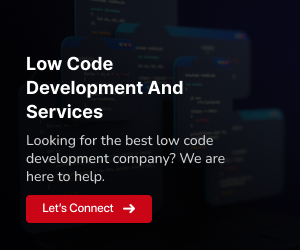The future of IT is undergoing a profound transformation with the widespread adoption of no-code tools, heralding a new era of efficiency and innovation. These tools, designed for individuals with little to no coding experience, empower a broader spectrum of users to participate in software development. This democratization of development fosters rapid solution delivery, as business professionals and domain experts can craft applications tailored to their specific requirements.
In this evolving landscape, businesses can anticipate shorter development cycles, reduced costs, and heightened agility. No-code platforms facilitate swift prototyping and iterative development, enabling organizations to respond promptly to dynamic market conditions and evolving customer needs.
Furthermore, the accessibility and user-friendliness of no-code tools address the IT skills gap. Non-technical team members can actively contribute to application development, allowing IT specialists to focus on complex tasks and strategic initiatives.
With the rising demand for customized solutions, embracing no-code tools is not just a choice but a vital step in maintaining competitiveness in the IT industry. These platforms are poised to revolutionize software development, creating a future where technology is more accessible, agile, and aligned with business demands.
The transition to no-code development is changing the landscape
The growing trend and adoption of no-code development practices. No-code development empowers individuals with varying technical backgrounds to create software applications without the need for extensive coding knowledge. This shift signifies a departure from traditional development methods, which often require specialized coding skills.
No-code platforms provide intuitive interfaces, pre-built templates, and drag-and-drop functionalities that simplify the app creation process. This democratization of software development allows a broader audience, including business professionals and non-technical users, to actively participate in and contribute to application development.
The future of IT lies in embracing no-code tools. As these tools continue to evolve and gain prominence, organizations can benefit from accelerated software delivery, increased agility, and enhanced collaboration between technical and non-technical teams. This shift towards no-code signifies a more inclusive and efficient approach to app development, promising to shape the future of information technology.
The rise of no-code: A glimpse into the future of coding
The future of coding is undergoing a transformative shift towards a no-code approach. This change is driven by the need for businesses to rapidly innovate and deliver digital solutions. No-code platforms empower individuals with various technical backgrounds to create applications without extensive coding knowledge. This democratization of app development fosters collaboration, enabling business professionals and citizen developers to participate actively.
No-code tools significantly accelerate development timelines by simplifying coding complexities, facilitating rapid prototyping, and quick deployment. In essence, the future of coding lies in the accessibility, speed, and collaboration offered by the no-code paradigm, revolutionizing software development and digital innovation.
How no-code empowers widespread innovation
No-code has become a catalyst for widespread innovation, fundamentally transforming how we approach technology. By removing the need for traditional coding skills, it empowers a broader range of individuals, from business professionals to entrepreneurs, to engage in software development. This democratization of innovation breaks down barriers and fosters a culture of problem-solving and creativity.
The intuitive, visual interfaces and ready-made components provided by no-code platforms streamline the development process, significantly reducing the time and effort required to bring new ideas to life. This rapid prototyping and deployment empower innovators to experiment, iterate, and refine their solutions at a pace previously unimaginable.
Moreover, no-code’s accessibility and ease of use make it an ideal tool for addressing specific industry challenges, optimizing workflows, and responding to changing market demands. It bridges the gap between technology and domain expertise, ensuring that those closest to the problems can be active contributors to the solutions.
In essence, no-code has democratized innovation by making technology more accessible, accelerating development cycles, and enabling a broader range of individuals to drive change and progress in their respective fields.
The transformation of education in the era of no-code
“The Transformation of Education in the No-Code Era” signifies a pivotal moment in the realm of education, driven by the widespread adoption of no-code platforms and technologies. This paradigm shift is fundamentally altering the landscape of teaching and learning, ushering in an era characterized by accessibility, simplicity, and democratized innovation.
In this context, education is undergoing a profound democratization process, breaking down the barriers that have traditionally limited access to knowledge and technology. No-code tools empower students and educators of all backgrounds, irrespective of their coding expertise, to create digital solutions with ease.
Furthermore, educational institutions are harnessing the potential of no-code technologies to enhance administrative efficiency and tailor educational experiences. This results in highly personalized, adaptable curricula that cater to individual learning styles, thereby revolutionizing the quality and inclusivity of education.
As we embrace the no-code revolution, education is transcending conventional boundaries and embracing innovation as an integral part of the learning journey. Students are gaining not only subject knowledge but also crucial digital skills that are indispensable for their future success in an increasingly tech-driven world.
Unlocking the Potential of No-Code in Response to the Pandemic
No-code platforms have emerged as invaluable tools in the pandemic-era digital landscape. These platforms have empowered organizations and individuals to tap into the vast possibilities of software development without the need for extensive coding knowledge.
Amid lockdowns, remote work requirements, and rapidly changing business needs, no-code solutions have acted as keys to unlocking innovation. They have enabled the rapid creation of diverse applications, from remote collaboration tools to contactless service delivery systems, all without the traditional development timelines.
No-code has not merely responded to the pandemic but has proactively driven transformation, allowing businesses to adapt, thrive, and discover new potential in an otherwise challenging environment.
The no-code revolution has officially begun
We stand on the brink of a paradigm shift where the ability to create intricate software solutions is no longer confined to seasoned coders. Instead, the advent of no-code platforms is paving the way for a new era of inclusivity, allowing individuals from diverse backgrounds to participate in application development. Geekyants is pioneering the no-code movement, empowering users to effortlessly create custom software solutions without coding expertise.
This revolution signifies the democratization of software creation, making it accessible to a broader audience, including business professionals, entrepreneurs, and domain experts. It highlights that traditional coding is no longer the sole route to building digital solutions, with no-code tools taking the lead in driving innovation and streamlining processes across industries.
This shift emphasizes the growing importance of no-code development in expediting digital transformation and enabling non-technical individuals to turn their ideas into fully functional software applications.






















